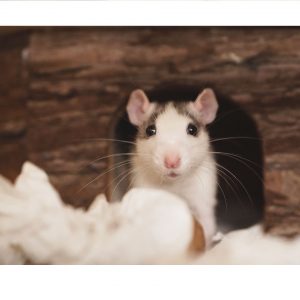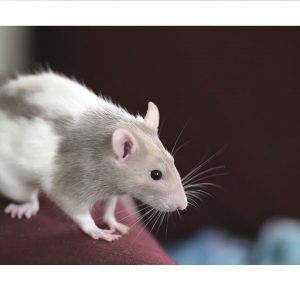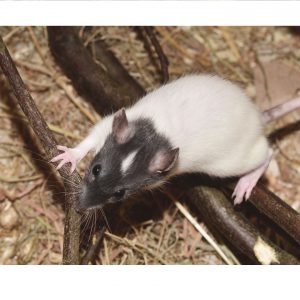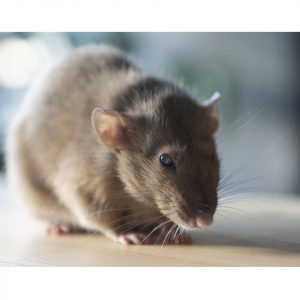There are some reasons for pet rat sneezing. If it’s a single sneeze in a day, there’s nothing to worry about. However, sneezing might be a sign of disease as well. It’s important to know all the signs and what to do to avoid further sneezing or disease!
Why is your pet rat sneezing? It can be a result of stress. Usually, this isn’t a case for worry, since the sneezing will stop and won’t be constant. Other times it can just be a nose irritation, caused by dust or other smells. However constant sneezing along with other signs means your pet rat has a respiratory disease!
It is important to check on your pet rat and their environment. And that’s all we’re going to go through in this post. Reasons for your pet rat sneezing and how to best deal with it. So let’s start!
Sneezing Because Of Respiratory Diseases
Pet rats are prone to respiratory diseases. Their respiratory systems are very fragile and they’re very sensitive to strong smells. This is why it’s so important to be sure their cage stays in a place well ventilated!
Smoking, perfumes and even scented bedding (check my article on bedding) can be very bad for them if persistent. The same goes for their own waste. We always clean up their droppings and any wet bedding that’s in the cage, so that the smell doesn’t build up.
It’s not only so the cage has a better odor. Urine produces ammonia and other fumes that are very bad for our rodent friends if not cleaned daily! This can lead to an irritation in the lungs and eventually disease.
So a good way to protect your pet rats lungs is by being sure they stay in a well-ventilated place. Avoid strong smells in the room and clean their litter daily!
Pet rats don’t normally sneeze. It can happen once in a while, however, if you notice your pet rat is sneezing constantly than this can be a sign of disease.
Other signs look for are:
- Lethargy: pet rats are usually quite active, especially at night. So if you notice that at their most active time, your pet rat isn’t interested in playing nor moving around, it is a sign of distress. This is often accompanied by a hunched position as well as avoiding contact with you. Pet rats are prey animals, so they’ll do all they can to not show weakness.
- Fast or labored breathing: since it’s a respiratory problem, your pet rat will have some difficulty to breathe. Either by doing it too fast or haunched when breathing. Check if they make a click or raspy noises when breathing!
- Porphyrin secretions: this is a red secretion that happens around the eyes and nose when a pet rat is in distress. Sometimes it might be just some form of stress and it’ll pass, but when accompanied by other signs, it might mean your pet rat is sick.
- Weight loss: just like us, pet rats will lose their appetite when sick. Pet rats lose weight very fast, so it’s important to notice if they’re eating and if not, bring them to a vet so they can check on your rodent friend.
- Puffed and matted fur: usually pet rats fur is very shiny and smooth. When a pet rat is sick, the fur will look puffed, tangled and matte. This is a very obvious sign when a pet rat is sick and very easy to discern.
If you notice one or more of these signs, then the best course of action is to bring them to the vet. Pet rats health can deteriorate very quickly, so it’s important to check on them once we notice they’re not feeling well!
You might also want to pay close attention to your pet rat’s fur in general. If you notice it’s getting a bit yellow, be sure to read my article on Yellow Fur In Pet Rats, Should You Be Worried?
Irritation On Their Nose
A far less alarming reason is just having a small irritation on your pet rat’s nose. This may be due to dust accumulating in their cage, some pollen, scented beddings, and other strong smells.
In this case, the rat will probably sneeze only once in a while. Try to change their beddings or eliminate other problematic dust/smells. For example, if you smoke, avoid smoking near your rodent friends.
If you like to use scented candles or incense, make sure you do as far away from the cage room as possible.
Finally, check their bedding. Wood beddings, for example, can produce lots of dust. I usually recommend paper-based bedding like the Carefresh Complete Bedding. It will not only mask the odor, but it won’t leave dust!
Alternatively, you can use old fabric you might have at home to use as bedding in some places. Remember that it should be cleaned weekly, maybe even exchanged once in a week!
Stressed Rats Sneeze
If you’ve just gotten your pet rat(s) and brought them home, they might be stressed with their new environment.
In this and other cases of stress, your pet rat might sneeze. They will also normally produce a sort of red liquid near their eyes and nose called porphyrin when they are stressed.
As long as the sneezing isn’t too constant and it stops after a while, there is no cause for alarm. Pet rats stress very easily and a change in their usual routine can affect them.
This is why it’s recommended to not change their cages too often, so they can get used to it and feel safe.
Stressed rats not only sneeze, but also tend to overgroom. As you can read in my article about the reasons your pet rat is grooming (itself, each other, and you)!
If they’re still very active and curious as well as they’re breathing and eating normally, they’ll go back to normal in a tick! If you notice other changes in their behavior, then bring them to a vet so they can be checked.
Is My Pet Rat Sick?
As we’ve discussed, your pet can have respiratory diseases. Most of the times are due to Mycoplasma pulmonis. This is the most common bacteria. This can lead to full-blown pneumonia, which if not treated, can be fatal.
Not only that, but the Mycoplasma can lead to other bacteria and viruses. This is why it’s so important to bring your pet rat to a veterinary once you notice any signs of sickness.
If caught very early, the sickness can be more easily treated without the use of great amounts of medication. On the other hand, if these bacteria and virus start joining in together, your pet rat will need more medication and care.
The medication that exists isn’t normally made for pet rats, so we usually need to be sure to give the right amounts of it. Not only that, too much medication can have negative effects. Just like with us!
Again, if you notice your pet rat sneezing a lot, having difficulty breathing, being very lethargic and avoiding contact, bring them to the vet.
This way a professional can look at them, know better what’s happening and help your rodent friend.
Treating Your Pet Rat
Treatment of respiratory diseases is, most of the times, pretty straightforward. You need to take your pet rat to the vet and give them medicine like antibiotics.
Of course, your veterinarian will know best on what exact medication should be given.
Unfortunately, most of the times the treatment won’t completely cure your pet rat. This will just detain and hold back the worst parts of the disease, meaning that your pet rat may relapse in a few week or months.
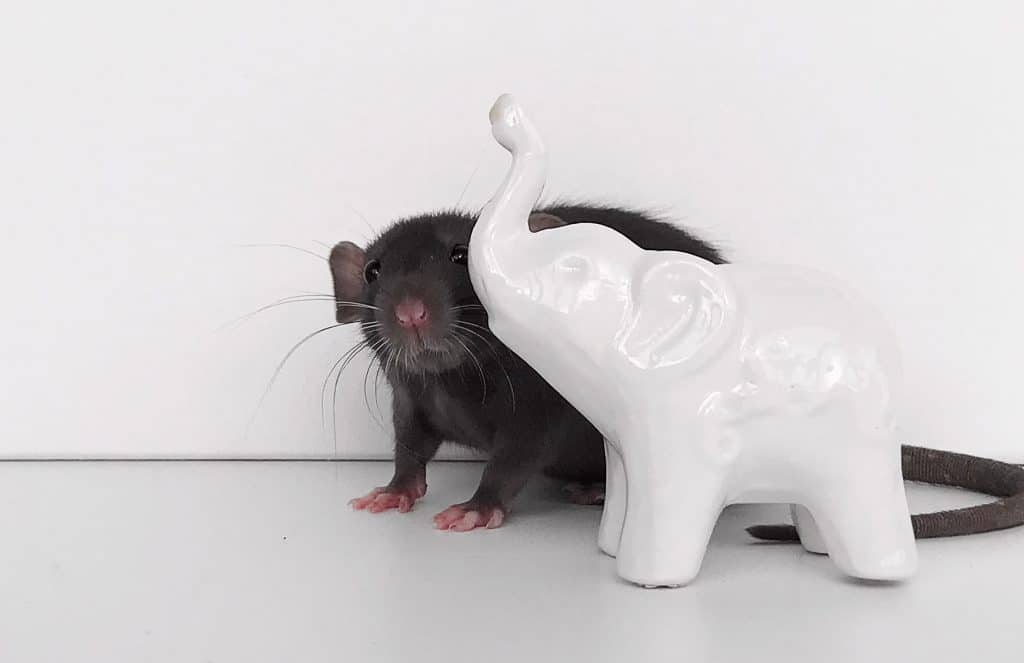
Still, this is always better than letting your pet rat suffer from their disease! It will also help alliviate the irritation of constant sneezing on your pet rat.
Even if it isn’t curable, it is treated and your rodent friend can still have a healthy and happy life! When relapsing occurs, it’s important to bring them to the vet so they can give you new antibiotics.
Not only that, but it’s important to give a good and nutritious diet to your pet rat. Namely, VitC, which is very important if they’re prone to respiratory diseases.
Most of the times, your vet will even recommend supplements to add to the water. This is extra vitamins that are good not only for the sick rat but for the others as well!
Remember to give them fresh fruit and veggies frequently, since these will also boost their diets and keep them healthy.
Reducing The Risk Of Respiratory Diseases And Relapsing
There are a few ways to reduce the risk of your pet rat having a relapse or getting an infection in the first place before they start sneezing.
As I mentioned a cleaned cage can go a long way. Make sure to clean their litter daily and any wet bedding that’s in the cage. This way it avoids the ammonia created by the urine. Not only will the cage smell fresher, but your pet rat won’t be inhaling any dangerous fumes.
Then, once a week do a deep cleaning of the cage. Remember to not use strongly scented detergents! This can linger in the cage even after washing. The chemicals in them are too strong and your pet rats might inhale them.
Simple dish soap is usually more than enough and won’t be bad for them. Alternatively, you can buy a safe for pets cleaner like the Better Life All-Purpose Cleaner on Amazon. This way you’re sure your pet rat is safe from any strong odors.
These are usually good for any kind of pet and can be used to clean the whole house. It is honestly good for our pets, but also for us, since the chemicals in cleaners are usually too strong even for us!
Then, of course, be sure that their bedding isn’t too dusty and to avoid strange and strong odors near the cage, such as candles and other perfumes.
Finally, be sure that the room where your rodent friends are staying isn’t too humid. Nothing makes the bacteria grow like humidity!
If needed, use a dehumidifier, like this Pro Breeze Electric Mini Dehumidifier (link to Amazon). We live in a very humid area, so we usually have more than one at home, for different rooms!
These are great since they’re very portable and easy to use. Just turn it on and leave it for the night. Once it fills, just take the container out, empty it and it’s ready to use again!
Lastly, but not least, if you notice signs of respiratory disease appearing again, bring your pet rat to the vet as fast as possible, so they can be given the right medication and be up to perfect health again.
And if your pet rat tends to have many medical issues, you might be inclined to get a small insurance for your pet rat. You can read more about pet rat insurance right here in this article.
Back to the Blog


